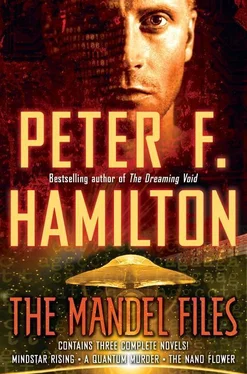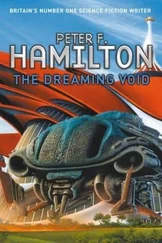“It would be a logical assumption,” Morgan said grudgingly. “If someone was aware Kitchener was contracted to Event Horizon, was receiving money from us, they could well think it was for energy research. Especially if they knew it was coming from Cormac’s office, the inventor of the gigaconductor.”
Eleanor rapped a knuckle lightly on the table, and tilted her head to look at Julia. “How are you going to power Prior’s Fen?”
It took a second for her thoughts to jump between subjects. “I’m considering two options. The first is an Ocean Thermal generator system, with floating platforms anchored out in the Atlantic, and bringing the electricity ashore with superconductor cables. Second is to drill a couple of hundred deep bore holes across the Fens basin, then insert direct thermocouple cables down them, siphon energy right out of the mantle. The tower and the projected cyber precincts certainly can’t be powered from existing mainland sources, the capacity simply doesn’t exist. Costwise, direct coupling has the edge, naturally since there are no moving parts to maintain once the holes have been sunk. In engineering terms, ocean thermal is a more mature technology. So at the moment I’m just waiting to see if Cormac makes any significant progress on direct thermocoupling in the next ten months. We don’t have to make the actual selection until the end of the year.”
“I’d like it to be earlier,” Philip muttered.
“Behave, Grandpa.” She found the camera lens, above the flatscreen, and gave it a stern look.
“So it would make a lot of sense for you to be working on third, fourth, even fifth alternatives,” Eleanor mused.
“Yes, absolutely. But we’re not.”
“What other embryonic technologies could supply the rise in industrial demand?” Greg asked. “And more importantly, who is working on them?”
“Grandpa?”
“Easy enough, m’girl. There are really only five viable candidates. Jetstream turbines, when you tether large vacuum bubbles twelve kilometres up and fit them out with giant rotor blades. The wind velocities up there are pretty impressive. Next, you’ve got cold fusion.”
Cormac grunted disparagingly. But when Julia looked at him, he just moued and went back to gazing out of the window.
“Well they might crack it,” Philip said grumpily. “I’m just listing options.”
“Go on, Grandpa.”
“Microfusion reactors, which is a sort of advanced version of cold fusion, using molecular-scale compression techniques to fuse extremely small clusters of deuterium atoms in a gizmo the size of a processor chip. Something that small does away with the heat sink problems you get in tokamaks, but you’d need to group a lot of reactors together to produce a decent output. Ocean current turbines. But there’s a question mark over which currents. Gulf Stream, Mozambique current, the Kuro Shio, East Australian current, Cape Horn current; they’re all possibles, but they’re all remote from Europe. Then there’s solar satellites. Cheap and practical, especially now we’ve got the Clarke spaceplane. But there isn’t a government in the world that’ll grant a licence to site a receiver array. Too many environmental-or rather environmentalist-problems when it comes to beaming energy through the atmosphere.”
“Who is researching them?” Greg asked.
“Apart from the powersats, just about every kombinate, plus dozens of universities under government contract. The whole world needs an energy source which won’t add to the Greenhouse effect.”
Julia clasped her hands together, mind devouring the problem eagerly. She didn’t even need to bring the nodes on line. “Grandpa, are there any research teams working on boron proton fusion?”
“Yes, several.”
“OK, compile a list of the twenty-five most promising research and design teams for boron proton reactors, and each of the other projects you mentioned, then cross-reference them with Diessenburg Mercantile.”
“Gotcha, girl.”
“Isn’t that one of our banks?” Morgan asked.
“Yes.” She told them about the conversation with Karl Flildebrandt;
“Interesting,” Greg said. “I wish I’d been there.”
“Got one, Juliet,” Philip said. He sounded slightly apprehensive, which was unusual. “The Randon company. They have a loan package of eight hundred and fifty million Eurofrancs with Diessenburg Mercantile, two hundred million New Sterling. Two-thirds of it was spent constructing a laboratory complex outside Reims, which is dedicated to investigating microfusion techniques.”
“Has to be,” Morgan said quietly.
“Randon also sponsor Nicholas Beswick,” Philip said flatly. Greg sat up straight, staring at the terminal at the head of the table.
“No such thing as coincidence,” Gabriel said. It came out almost as a challenge.
Greg glanced at her fleetingly. “No,” he said firmly.
“Oh, come on, Greg. Psi isn’t perfect.”
“Tell you, if it had been any one of the others, I would have said, maybe. But Beswick, no chance.”
“If you say so,” she looked away, uninterested.
“This is all based on very spurious assumptions,” Cormac said.
“Yeah, maybe,” Greg said. He sounded troubled. “Royan, this rumour about Kitchener working on boron proton fusion, did it exist before he was snuffed?”
YES YES YES. HEAVY DUTY SPECULATION AS SOON AS EVENT HORIZON PAYMENTS WERE MADE TO HIS BANK ACCOUNT
“For Christ’s sake,” Morgan said tightly.
SORRY BUT PEOPLE LIKE KITCHENER ARE ALWAYS BEING SCANNED BY HOTRODS. HIS WORK IS INTERESTING, NOT TO MENTION COMMERCIAL.
“But nobody knew for certain what he was doing, right?” Greg persisted.
RIGHT THE LIGHTWARE CRUNCHER AT LAUNDE WASN’T PLUGGED INTO ANY DATANETS. KITCHENER PROBABLY DIDN’T WANT TO RISK HAVING DATA-SNATCHES RUN AGAINST HIM. SMART MAN. THAT’S WHY THERE WAS THE INTEREST IN HIM.
The lines on Greg’s face deepened, he looked down at the table, lost in contemplation. Eleanor gave him a concerned glance.
Julia found the level of almost unconscious devotion between them was utterly enchanting. Chiding herself for peeking.
“It couldn’t be Nicholas Beswick,” Eleanor said, “because he knew Kitchener wasn’t working on boron proton fusion for Event Horizon. So he wouldn’t have wiped the Bendix, would he?”
Greg let out a relieved sounding sigh, and smiled at her. “I think I’ll put a bonus in your wage packet.”
She grinned back.
“Exactly what was Kitchener working on for you?” Gabriel asked.
“Wormhole physics.” Cormac started to explain.
Julia was moderately surprised Morgan hadn’t told Gabriel about the research contract. He must take need-to-know far more seriously than she’d ever imagined. She didn’t know whether to be amused at the notion or not.
“A stardrive!” Gabriel said incredulously when Ranasfari finished. She looked at Julia for confirmation.
“Yes, ‘fraid so.” Schooldays discipline rescued her once again. But Gabriel’s expression did look so funny, probably the same as hers when Cormac had first confronted her about having the murder solved.
“Royan,” Greg said slowly. “Was there any hint of that on the circuit?”
NO NO NO. NO! WOW A STARDRIVE, ULTRA EXCLAMATION MARK. HOW FAR HAD HE GOT?
“There was no prospect of him ever developing a stardrive mechanism,” Cormac Ranasfari said, distaste at the idea showing on his compact face. “Edward was simply working on the physics which could open the opportunity for theoretical instantaneous transit.”
“Did this research involve neurohormones at all?” Greg asked.
“Most certainly. Edward was attempting to formulate a themed neurohormone which would enable him to investigate the possibility of CTCs existing. He and I considered that to be the most promising route to verification.”
Читать дальше












